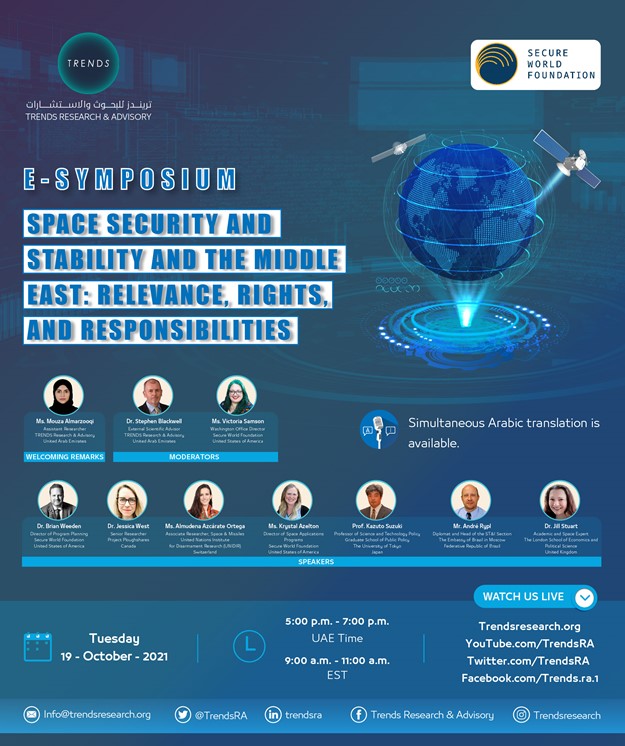Space Security and Stability and the Middle East: Relevance, Rights, and Responsibilities
When: Tuesday, October 19, 2021
Time: 5-7 pm UAE Time / 9-11am ET
Where: Virtual

The space domain is undergoing a significant set of changes. A growing number of countries and commercial actors are getting involved in space, resulting in more innovation and benefits on Earth but also more congestion and competition in space. From a security perspective, an increasing number of countries are looking to use space to enhance their military capabilities and national security. Most of the space applications they are developing are not new. What has changed is the proliferation of these capabilities beyond just superpowers.
This creates an increased risk that incidents in space can spark or escalate conflict on Earth. As well, the actual use of offensive counterspace capabilities could have long-lasting consequences for humanity, whether through the loss of critical space capabilities that underpin the global economy and societies or through the creation of long-lived space debris that hinders future space activities.
Multilateral discussions on space security are stuck: they have not been able to make much progress on space security issues and have been having the same arguments for decades. Furthermore, given geopolitical complexities, the gulf between various established space powers as to what is considered to be a space security threat is widening; meanwhile, emerging space actors are not substantially engaged beyond rhetoric, yet space security and stability affects all.
In order to truly see that space continues to be accessible to and usable for all over the long-term, all stakeholders should be part of the conversation about how best to work toward a predictable, stable domain. It is important to improve the capacity of all actors to understand the relevance of space security to their continued benefit from space and to ensure that the solutions generated meet the needs for all space stakeholders.
The Secure World Foundation and TRENDS Research and Advisory co-hosted a virtual one-day workshop to highlight the importance of space to the people of the Middle East and to discuss why space security matters, the current state of counterspace capabilities globally, the role countries of the Middle East can play in multilateral discussions on space security and identifying responsible behavior on orbit, and paths forward to generating progress in multilateral fora on these issues.
Agenda
*all times listed are UAE time
|
5:00 p.m.
|
Welcoming Remarks Ms. Mouza Almarzooqi, Assistant Researcher, TRENDS Research & Advisory, United Arab Emirates |
|
|
Panel 1: The Importance and Relevance of Space to the Middle East |
|
5:05 p.m. |
Overview – Moderator Dr. Stephen Blackwell, External Scientific Advisor, TRENDS Research & Advisory United Arab Emirates |
|
5:10 p.m. |
The Role of Space in Monitoring Climate Change Ms. Krystal Azelton Director of Space Applications Programs, Secure World Foundation United States of America |
|
5:20 p.m. |
Space Priorities and Challenges in the Middle East: A Geopolitical Perspective Dr. Jill Stuart, Academic and Space Expert The London School of Economics and Political Science, United Kingdom |
|
|
Panel 2: Space Security and Stability: Status, Vulnerabilities, Ways Ahead |
|
5:30 p.m. |
Overview – Moderator Ms. Victoria Samson, Washington Office Director, Secure World Foundation United States of America |
|
5:35 p.m. |
Global Counterspace Threat Assessment Dr. Brian Weeden, Director of Program Planning, Secure World Foundation United States of America |
|
5:45 p.m. |
Multilateral Space Security Discussions: Outlook and Policy Implications Ms. Almudena Azcárate Ortega, Associate Researcher, Space & Missiles, United Nations Institute for Disarmament Research (UNIDIR), Switzerland |
|
5:55 p.m. |
Current Status of Space Security and Stability Prof. Kazuto Suzuki, Professor of Science and Technology Policy, University of Tokyo, Japan |
|
6:05 p.m. |
Space Security and Stability: Norms of Behavior Dr. Jessica West, Senior Researcher, Project Ploughshares, Canada |
|
6:15 p.m. |
Looking Ahead to Improving Space Security and Stability Mr. André Rypl, Diplomat and Head of the ST&I Section, The Embassy of Brazil in Moscow Federative Republic of Brazil |
|
6:25 p.m. |
Open Discussion |
|
6:55 p.m. |
Closing Remarks |
For more information, please contact SWF Washington Office Director Victoria Samson.

 Share
Share